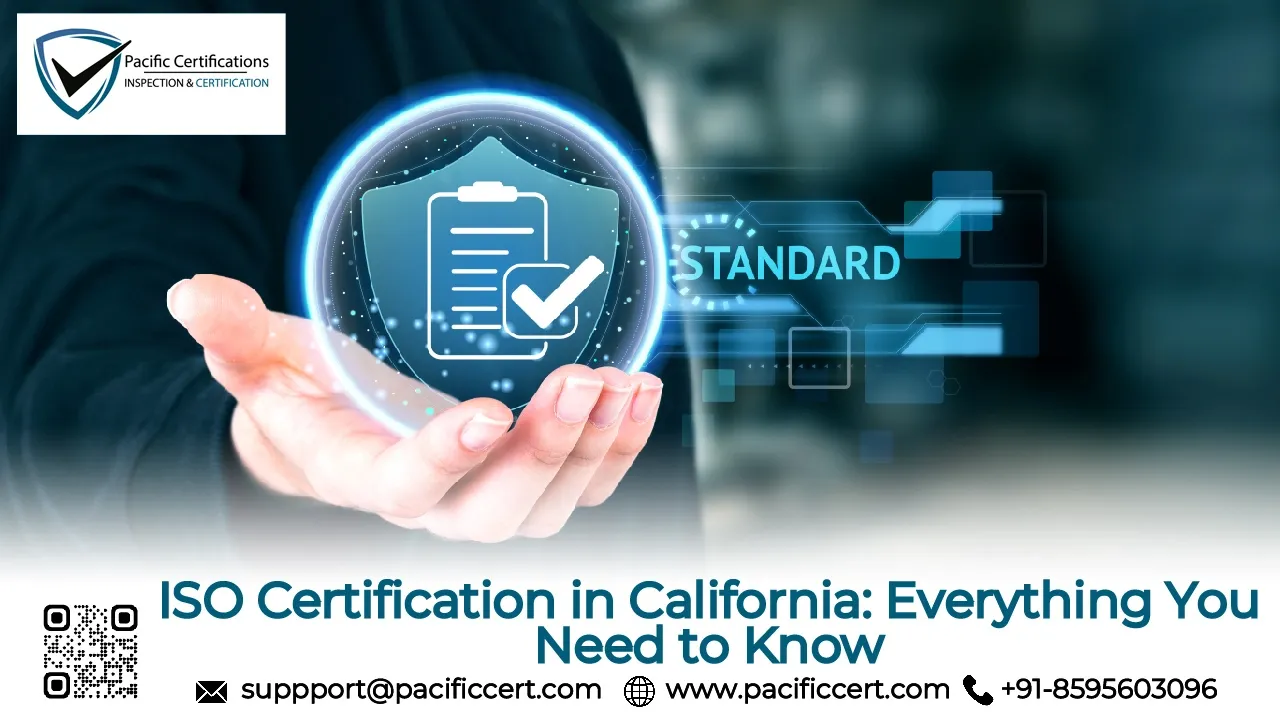ISO Certification in California: Everything You Need to Know

Introduction
In the globally connected economy today, ISO certification has become more than just a badge of quality, it’s a tactical tool that drives credibility, compliance, and business performance. From getting internal processes on track to gaining trust in global markets, ISO standards are important for organizations aiming to stay competitive.
The interest in ISO certifications in California is rapidly increasing. Things like the state’s stringent regulatory landscape, importance on sustainability, and its dominance in global tech, biotech, and clean energy industries make ISO certification more relevant than ever. From Silicon Valley tech firms to logistics hubs in Los Angeles, business across all the states are adopting ISO standards to meet client expectations and regulatory requirements.
What is ISO Certification and Why It’s Gaining Ground in California?
ISO certification is the formal approval by a third party body that a company’s management system complies with a particular ISO standard, such as ISO 9001 for quality or ISO 27001 which is related information security. These certifications explains that a business meets globally recognized benchmarks in areas like quality management, environmental performance, if it is ecofriendly or not and data security.
ISO certification is gaining importance in California due to the unique pressures and opportunities in the state’s economy. The need of internationally recognized systems to manage operations by the rising tech startups is something we should look upto. Businesses across sectors are under increasing pressure to comply with environmental regulations, which makes certifications like ISO 14001 and ISO 50001 more desirable. Additionally, legal compliance and risk management requirements drive interest in standards such as ISO 27001 and ISO 45001.
What Are the Popular ISO Standards in California?
ISO 9001:2015 – Quality Management Systems
It is very Commonly used across all industries to enhance customer satisfaction, consistency, and documentation practices.
ISO 14001:2015 – Environmental Management
It is very very useful for companies looking to meet California’s strict environmental policies and sustainability goals.
ISO 27001:2022 – Information Security Management Systems
This one is crucial for safeguarding data and securing information infrastructure, especially in tech and SaaS industries.
ISO 45001:2018 – Occupational Health & Safety
This is related with the working conditions of the employees. This helps organizations identify and reduce risks related to employee safety and workplace conditions.
ISO 22000 – Food Safety Management
This one is important for food processors and distributors to ensure hygiene, safety, and traceability in their supply chains.
ISO 50001 – Energy Management Systems
It Support businesses in making energy performance better, reducing consumption, and aligning with California’s energy efficiency initiatives.
Why ISO 9001 Matters to U.S. Businesses?
- Marking Quality as a Competitive Edge
ISO 9001:2015 is a certification which enables businesses to enhance customer acceptance and improve product or service quality. This is especially important in Business to business environments, where buyers often require suppliers to hold valid ISO certification. - Enhancing Reputation and Risk Reduction
Certified businesses show transparency and commitment to continual betterment. This helps reduce operational errors, improve documentation, and avoid costly rework or customer dissatisfaction.
What is the Local Impact and National Reach of ISO Certification in California?
California’s industries are some of the most diverse, popular and globally spread in the United States. From biotech and clean energy to advanced manufacturing and logistics, businesses across the state are taking advantage of ISO certifications to strengthen their operations and reputation. ISO certification enables organizations to compete for national contracts while aligning with international standards.
Cities like Los Angeles and San Francisco are seeing rising adoption of ISO standards due to their dense business ecosystems and global outlook. In San Jose and San Diego, technology and defense contractors are applying ISO 27001 and ISO 9001 in order to meet compliance requirements and reach competitive advantage. Sacramento is a city close to government operations and it has become a hub for ISO certified service providers aiming to work on public sector projects.
What is the Role of ISO Certifications in California Supply Chains?
- It helps in Strengthening Resilience and Compliance
Standards like ISO 27001 and ISO 22301 help businesses secure sensitive data, reduce risks, and ensure operational continuity, particularly in the face of cyberattacks or natural disasters. - It shows Procurement Benefits
ISO certified businesses are often prioritized in procurement processes, especially for contracts with government bodies, large enterprises, or multinational corporations requiring consistent and verifiable quality.
Startups and ISO: A Smart Match in California
- Why do Startups Embrace ISO Early
Many startups which are based in pursue ISO certification in the very early stages to boost investor confidence, prove operational maturity, and demonstrate readiness for global scale. - Fast-Growth, High-Compliance Sectors
Startups in FinTech, MedTech, SaaS, and renewable energy are especially active in obtaining ISO certifications. These industries often face strict policies, demands and certification helps ease access to high value markets and clients.
Are you planning to export from the USA? Skipping ISO Certification Might Be a Dealbreaker
California businesses who are aiming to expand globally must find a complex web of international policies. ISO certification can serve as a passport to international trade by indicating compliance and operational readiness. Standards like ISO 9001, ISO 14001, and ISO 27001 are widely recognized in the European Union, the United Kingdom, Canada, Australia, and across Asia Pacific.
In many B2B deals, especially in regulated industries, one not having ISO certification can lead to incapability of the company. International distributors and customers are increasingly requiring certified partners to ensure product quality, data protection, and environmental stewardship. In this way, ISO can make or break overseas expansion.
What is the Cost of ISO Certification in California?
The cost of ISO certification in California varies depending on several factors. These include the type of ISO standard being pursued, the size and complexity of the organization, and whether external consultants are used. A small business seeking ISO 9001 certification may spend less than a large enterprise pursuing ISO 27001 with extensive infrastructure.
Several variables influence the cost of ISO certification in California:
- Type of Standard : Some certifications like ISO 27001 may cost more due to technical audits.
- Company Size & Complexity : The more the process, the long will be the audit.
- Certification Body : Different accredited bodies may charge different fees based on scope and support.
Organizations with streamlined processes and clear documentation often go through the certification journey more efficiently and cost-effectively. On the other side, businesses which are operating in highly regulated or multi site environments may require more preparation and auditing, which can influence the overall effort involved and increase the cost.
It's important to note that certification costs are typically broken down into components such as documentation, training, internal audits, and the external certification audit itself. Additionally, ongoing surveillance audits are required to maintain certification. While exact figures vary, the best approach is to consult with a trusted certification body to receive tailored quote based on your business scope and goals
Ready to Get ISO Certified in California?
At Pacific Certifications, we specialize in helping businesses across the U.S. achieve ISO certification with ease, speed, and full compliance. Whether it's ISO 9001 for quality, ISO 14001 for environment, or ISO 27001 for information security, our expert team is here to guide you.
Contact us today at www.pacificcert.com
Email: [email protected]
Call/WhatsApp: +91-8595603096
FAQs: ISO Certification in California
What is the most common ISO standard in California?
The most widely adopted ISO standard in California is ISO 9001:2015, especially in manufacturing, professional services, and the tech sector.
How long does it take to get ISO certified?
The certification process approximately around takes 2 to 6 months. The certification process depends on your organization’s current level of readiness and internal resources.
Can small businesses in California afford ISO certification?
Of course, small business in California can get ISO certifications with the help of proper planning and streamlining processes. Several affordable options and consultants cater specifically to startups and SMEs.
Are there any local ISO consultants or trainers available?
California does have a strong network of experienced ISO consultants, especially in metro areas like Los Angeles, San Diego, and San Jose. Many of them also offer virtual support.
In there any sector in California where ISO certification is important?
While ISO certification is not legally mandatory, it is often a contractual requirement in sectors such as aerospace, defence, food production, and government contracting.
Ready to get ISO certified?
Contact Pacific Certifications to begin your certification journey today!
Suggested Certifications –
Read more: Pacific Blogs

